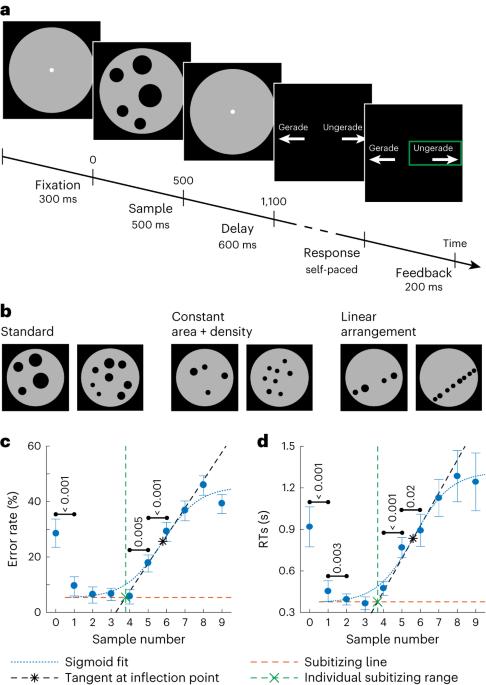人类内侧颞叶中大量和少量神经元的不同表现。
IF 21.4
1区 心理学
Q1 MULTIDISCIPLINARY SCIENCES
引用次数: 0
摘要
一个多世纪以来,人们一直在争论小数值是否由一个不同于大数值估计系统的特殊子系统来表示。在这里,我们展示了两种独立的神经机制,它们是小数字和大数字表示的基础。我们在神经外科患者的内侧颞叶进行了单神经元记录,以判断数字。我们在神经元编码中发现了一个围绕数字4的边界,它与从分类到估计的行为转变相关。在亚极化范围内,神经元表现出优异的调谐选择性,并伴有抑制效应,提示周围抑制是一种选择性增加机制。相反,调谐选择性随着超过4的数字的增加而降低,这是一个与比率相关的数字估计系统的特征。通过解码和聚类分析,还指出了编码边界将它们分开的两个系统。识别出的小数字分类系统可能与注意力和工作记忆有关,这些记忆显示出相当的容量限制。本文章由计算机程序翻译,如有差异,请以英文原文为准。

Distinct neuronal representation of small and large numbers in the human medial temporal lobe
Whether small numerical quantities are represented by a special subitizing system that is distinct from a large-number estimation system has been debated for over a century. Here we show that two separate neural mechanisms underlie the representation of small and large numbers. We performed single neuron recordings in the medial temporal lobe of neurosurgical patients judging numbers. We found a boundary in neuronal coding around number 4 that correlates with the behavioural transition from subitizing to estimation. In the subitizing range, neurons showed superior tuning selectivity accompanied by suppression effects suggestive of surround inhibition as a selectivity-increasing mechanism. In contrast, tuning selectivity decreased with increasing numbers beyond 4, characterizing a ratio-dependent number estimation system. The two systems with the coding boundary separating them were also indicated using decoding and clustering analyses. The identified small-number subitizing system could be linked to attention and working memory that show comparable capacity limitations. Kutter et al. show that neurons in the human brain encode small numbers (up to 4) more precisely than large numbers, indicating a distinction between a small-number subitizing system and a large-number estimation system.
求助全文
通过发布文献求助,成功后即可免费获取论文全文。
去求助
来源期刊

Nature Human Behaviour
Psychology-Social Psychology
CiteScore
36.80
自引率
1.00%
发文量
227
期刊介绍:
Nature Human Behaviour is a journal that focuses on publishing research of outstanding significance into any aspect of human behavior.The research can cover various areas such as psychological, biological, and social bases of human behavior.It also includes the study of origins, development, and disorders related to human behavior.The primary aim of the journal is to increase the visibility of research in the field and enhance its societal reach and impact.
 求助内容:
求助内容: 应助结果提醒方式:
应助结果提醒方式:


